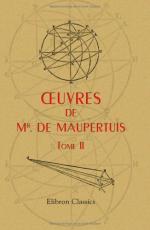|
This section contains 344 words (approx. 2 pages at 300 words per page) |
French astronomer, mathematician, and biologist
A mathematician, biologist, and astronomer, Pierre-Louis Moreau de Maupertuis was a strong proponent of Sir Issac Newton's theory of gravitation, helped confirm Newton's theory on the exact shape of the earth, and formulated the principle of least action in physics. Born in Saint Malo, France, Maupertuis had a wide range of scientific interests. As a biologist, he wrote Systéme de la Nature, in which he provided the first accurate scientific record of a dominant hereditary trait transmitted among humans. He also introduced the theory of the survival of the fittest in his Essai de Cosmologie, a theory that Charles Darwin later expounded to wide acceptance.
Maupertuis may be best known for his formulation in 1744 of the principle of least action, also known as the minimum principle or Maupertuis' principle. Essentially, the principle states that any change that occurs in the universe and nature, such as a moving body or light rays, changes in the most economical path possible. For example, bubbles form in a shape that presents the smallest surface for a given volume of air. In Essai de Cosmologie, Maupertuis presented his theory as something that might help prove the existence of God by unifying the laws of the universe. In 1736, Maupertuis led a famous expedition to Lapland near the North Pole that proved Newton's theory that the earth is an oblate sphere (flattened at the poles). The proof was accomplished by measuring the length of degree along a meridian and comparing the findings with the findings of another expedition near the equator in Peru performing similar measurements.
Despite his many accomplishments, Maupertuis was considered arrogant by many of his fellow countrymen. Eventually, Maupertuis became a target of German mathematician Samuel Koenig, who accused him of plagiarism, and of the French author Voltaire (1694–1778), whose satirical writings about Maupertuis were so savage that Maupertuis eventually left France. Maupertuis died in virtual exile in Basel, Switzerland, in the home of Swiss mathematician Johann Bernoulli (1667–1748).
See Also
|
This section contains 344 words (approx. 2 pages at 300 words per page) |


